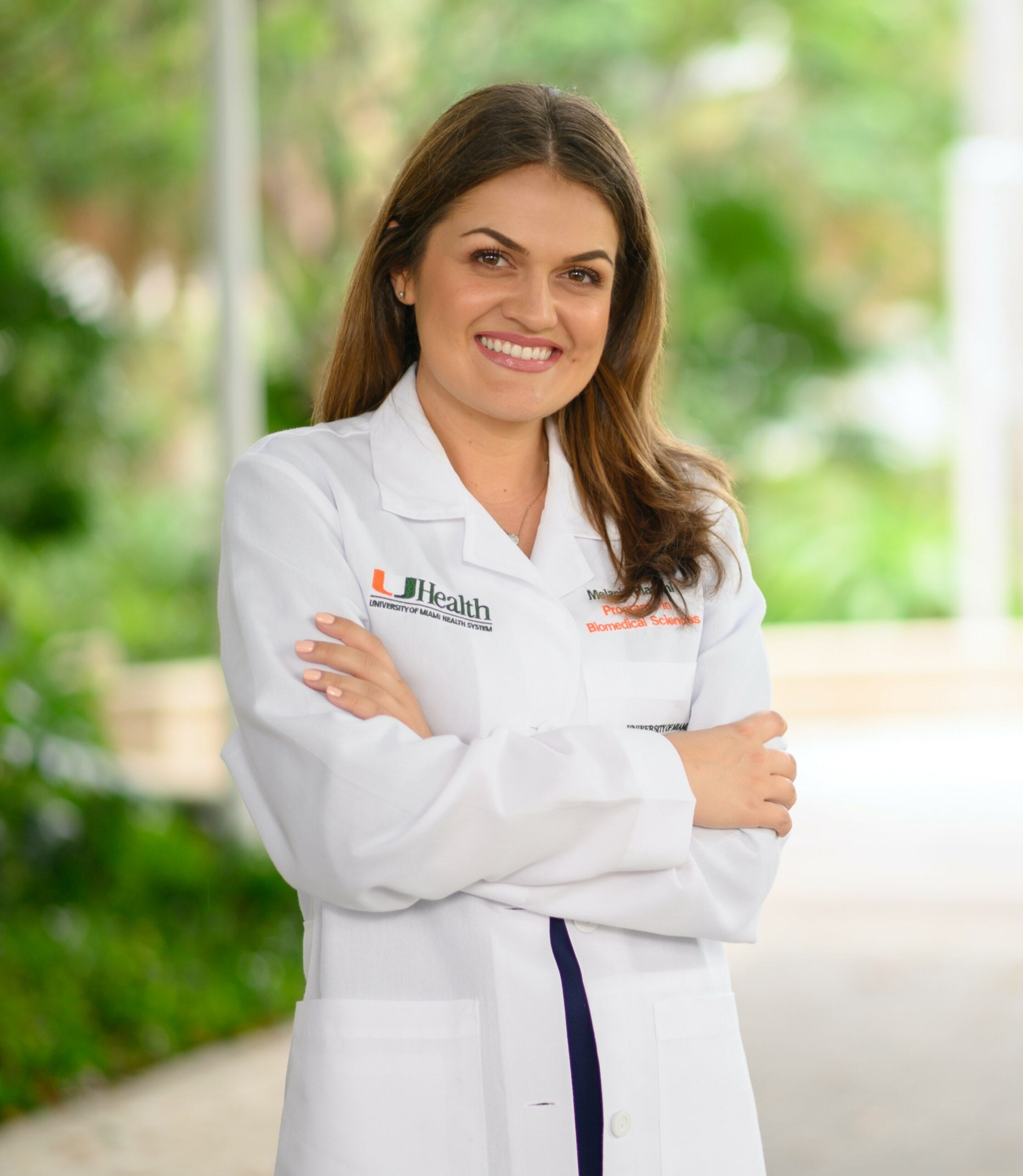May 2021 – One particular point of pride that Miami Project Co-Founder Dr. Barth Green and Scientific Director Dr. W. Dalton Dietrich like to mention is that The Miami Project is training the next generation of neuroscientists. Entering its 36th year of existence, Miami Project principal investigators are well into their second generation of neuroscientists, therefore accelerating the breadth of knowledge in the field, and speeding discovery on many fronts. Add Melanie Plastini to that long list of neuroscientists honing their skills in the Lois Pope LIFE Center, the home of The Miami Project on the campus of the University of Miami Miller School of Medicine. The fifth year Neuroscience graduate student, set to graduate in the coming months, possesses the kind of curiosity that fuels a genuine passion for science and discovery. She has been working in the lab under the tutelage of Roberta Brambilla, Ph.D., Associate Professor, Department of Neurological Surgery and The Miami Project to Cure Paralysis.
“When I was looking at neuroscience programs I knew I wanted to go to one with a focus on translational research, and as I learned more about The Miami Project and their translational research programs, I found Dr. Brambilla’s research page and felt that our research interests were aligned,” said Melanie.
Looking back on five years in Miami, her connection with Miami Project principal investigator Dr. Brambilla turned out to be great timing for both researchers. Dr. Brambilla was interested in expanding the use of inducible pluripotent stem cells in her lab, and Melanie had been working for a few years at Stanford University in a lab studying those same cells in a different application.
Dr. Brambilla recalled her first impressions of Melanie following her acceptance to the University of Miami Graduate School. “I thought she was a great person with a lot of expertise already. She is a team player and one who works really well in a collaborative environment. Over the years she has matured as a scientist and has become more and more a leader in the lab and the graduate school,” said Dr. Brambilla.
In her short career as a scientist, Melanie has produced a significant body of work both on her thesis project, and in shared projects with other lab members. Her dedication to the scientific process and hard work has paid off, resulting in a co-authored publication in Nature Communications (2018), a co-first author publication in the Journal of Neuroinflammation (2020), and a co-first author review in Frontiers in Cellular Neuroscience (2020), with several more in the final stages of completion.
Melanie’s time as a graduate student at UM has seen her appropriately noticed and recognized for her many contributions. She received the 2019 Lois Pope LIFE Fellowship Award for her dissertation research. In 2020 she was given the Edward J. Green Memorial Award. The award recognizes a graduate student who best exemplifies the qualities of the late Dr. Green, including scholarship, citizenship and service, dedication to the graduate program, and a spirit of cooperation and selflessness. In 2021 she won the Graduate Student of the Year Award from the UM Toppel Career Center and the Graduate Award for Excellence in Student Leadership from the UM Butler Center for Service and Leadership.
Throughout her time in Miami, Melanie has continued to participate in almost every activity associated with the Neuroscience Graduate Program. She has helped with the annual open house with poster presentations, chaperoning and giving tours to new students, training rotating graduate students, as well as undergraduates, and demonstrating fantastic mentoring and leadership skills.
Additionally, she took a role as teaching assistant for the Neuroanatomy class; and every year she organizes mock Qualifying Exams (QE) where she recruits senior students (including herself) to provide feedback to 2nd year students ready to undergo their QE. She is a Neuroscience Program Senator and serves on the executive board of the Biomedical Graduate Student Government.
In the lab she has been researching the role of neuroinflammation in multiple sclerosis (MS), specifically trying to determine if an intrinsic dysfunction in oligodendrocytes, the myelin forming cells of the central nervous system, plays a role in one of the forms of MS. The hypothesis is that this dysfunction could be an underlying cause of the disease. As part of her dissertation research, Melanie worked on induced pluripotent stem cells (iPSCs) from both MS patients and control individuals, she differentiated them into oligodendrocytes and analyzed their gene profiles to find out if there were any differences. She found that the patient cells were very different from the normal control cells and identified a few genes of interest and could play a role in the progression of the disease. Identifying the specific function of these genes could help unlock some of the mysteries associated with MS but could also open up new avenues of research for other neurological injuries, like spinal cord and brain injury among others.
In this process of studying these cells, the team was also looking for specific biomarkers so that physicians could diagnose MS faster and more accurately and track its progression. Often with neurodegenerative disorders it’s a process of elimination, so if researchers can identify the correct biomarkers, diagnosis could be made quicker, and interventions started earlier.
Following graduation, Melanie’s path will have her looking for cures closer to home. The Bay Area native has accepted a job at Stanford University studying Lewy body dementia. Her route toward the neurosciences was sparked by her witnessing Lewy body dementia take away her grandfather, so this field of research hits close to home.
“Things have really come full circle for me. The disease that inspired me to pursue neuroscience research in the first place is the one I will be pursuing at Stanford after I graduate. I will be working on Lewy body dementia, specifically looking for biomarkers, tracking the progression of the disease and trying to diagnose it sooner,” said Melanie.

